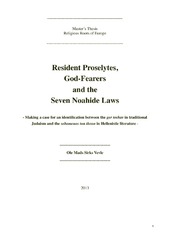Resident Proselytes, god-fearers and the Noahide laws. Making a case for an identification between the ger toshav in traditional Judaism and the sebomenos ton theon in Hellenistic literature
Abstract
The gerei toshav, resident proselytes, are met in the Hebrew Bible and rabbinic literature. They are defined by the sages of the Talmud as Gentiles who accepted upon themselves the seven Noahide commandments. These laws are taught as being the original covenant that God established between Himself and Mankind. After the Flood they were given over to Noah and his descendants, and are therefore known by his name. These laws consists of an obligation to recognize the existence of God and to observe basic moral laws. The Jews, in their role of being a «nation of priests» and «a light unto the Nations», have the task of educating mankind about their seven Noahide laws. The sebomenoi ton theon, God-fearers (or God-worshippers), are met in Hellenistic literature and in inscriptions. They are by scholars defined as Gentiles who frequent the synagogues, they are monotheist in the biblical sense, and they observe some Jewish practices, but they have not moved to full conversion to Judaism through circumcision. This group of pious Gentiles who somehow is connected to Jewish life has created much confusion in the ranks of scholars, and the debate about them concern wether or not they had an official status recognized by mainstream Judaism. The aim of the Master's thesis is to view these sebomenos as adherents of the seven Noahide laws and as such related to the ger toshav. The strength of this theory is its ability to explain the relationship between the God-fearers and the Jewish communities. It also explains the confusion that surrounds an often confused understanding of the Hebrew word ger. The lexical definition of proselytos (hebr. ger) undermines the existence of different categories of proselytes, namely the circumcised proselyte who becomes a naturalized member of the Israelite nation and the uncircumcised proselyte who is a foreigner residing with the Israelites, while retaining his own nationhood. This master's thesis attempts to reach its aim through an investigation of texts and doctrines of traditional Judaism as these are expressed in the Tanakh and rabbinic literature, and through an investigation of Hellenistic literature, such as the Septuagint, Philo, Josephus, and New Testament writings.
